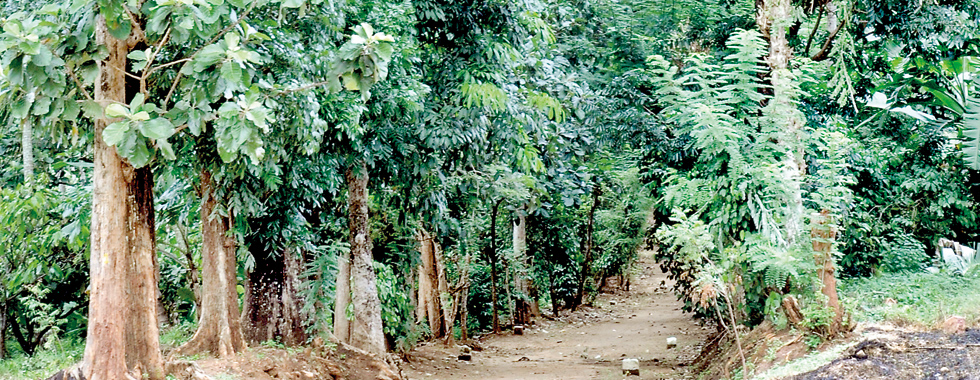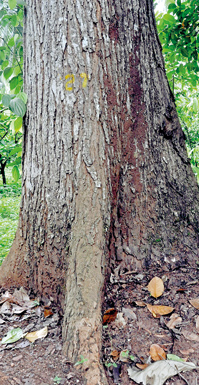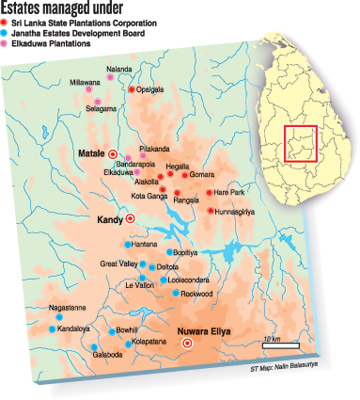News
Questions mount over felling of trees to pay EPF, ETF dues
Environmentalists and trade unions are concerned over proposed plans to fell over 60,000 trees for timber to raise funds for the outstanding EPF, ETF and gratuity payments in state run plantations. The three state sector plantations, Sri Lanka Plantations Corporation (SPC), Janatha Estate Development board and Elkaduwa Plantion, in the central highlands border the main watershed areas of the country.
While all parties are happy that the authorities are taking steps to make overdue payments they are concerned about the impact that such mass scale felling of trees in a short period of time could have on the environment.Last week, the Sunday Times reported that the Cabinet of ministers had approved a proposal to this effect on a recommendation put forward by State Resources and Enterprise Development Minister Dayasritha Tissera.
According to Janatha Estate Development Board Chairman Dr. Udayasiri Kariyawasam, the Cabinet paper has detailed that the felling of trees and the sale and allocation of the money to the proper funds should be done within six months of gaining approval.

Elkaduwa Plantations: Where the days are numbered for some of these trees grown for commercial purposes. Pix by Susantha Liyanawatte
The Sunday Times learns that the trees to be felled include Grevillea, Eucalyptus, Pine, Turpentine, Mahogany and Teak. While the majority of the trees to be cut down are Grevillea and Eucalyptus, the trees are to be replaced by Eucalyptus.
The price valuation of the trees is to be done by a committee comprising representatives from the plantation ministry, State Timber Cooperation (STC) and the Environment Authority, Dr. Kariyawasam who is also the acting Chairman of State Plantation Corporation said.
Sanjeewa Kaviratne, opposition member, Central Provincial Council (CPC), speaking to the Sunday Times raised concerns about the environmental impact of this move.
“I raised this in the Provincial Council as well. Some of the estates are in the areas declared as sensitive areas in 2004. For any tree to be cut in this area a proper Environment Impact Assessment has to be made but this has not been done. Instead, an initial environment assessment has been conducted,” he said.
In addition, environmentalists have questioned the method of felling and transporting the trees, pointing out the dangers of landslides and soil erosion in the long run.

“These estates fall in the high sensitive areas identified under the Social Conservation Act as the area includes that of the south bank of the Mahawali river and the Knuckles Range. So if the situation is not managed properly this could cause major issues. Further, due to the way the logs would be dragged through the ground surface when the trees are felled, there will be a large number of new water gullies created which would cause large scale erosion and damage” explained Gamini Jayathissa of the Grama Abiwurdi Environment Foundation.
Environmentalists also warn that large scale felling of trees in a short period of time may cause the water sources to dry up pointing out that the catchment areas of the country are located in this area.
However, according to Dr. Kariyawasam approval would be sought from the authorities concerned before the felling begins. “We have not given a blanket approval. They will have to identify each tree and give separate approvals. This has to be done by government officials within the limits they face such as shortage of personnel, resources and weather limitations,” he said.
Another concern raised is that the plantation companies have not devised a proper replanting and monitoring system to ensure a smooth transition after the mass felling of trees scheduled to begin within the next six months.
According to Mr. Kavirathne no proper system is yet in place to replant trees. The type of trees that would be replanted is also a cause for concern. Prof. Nimal Gunatilleke from Peradeniya University warned that if the felled trees were replaced by Eucalyptus it would have a negative emvironmental impact.
“Previously we planted Eucalyptus along our waterways but that was a wrong move. So it is a good idea to remove them. But we have to make sure we don’t re plant the same trees. These trees absorb more water than others in the first ten years of their lifetime which will not be suitable for the situation at hand,” he said.
However, this point was disputed by Elkaduwa Plantation Chairman Neil Bogahakanda who said the plantations have a good replanting and management system in place.
Meanwhile, trade unions, although welcoming the move by the State Resources and Enterprise Development Ministry to pay overdue employment benefits, have questioned the low valuation given by the STC.
“We have no issue with the plan to cut and sell the trees which have been planted for commercial purposes. However, by selling it only to STC the plantations are losing out. The valuation given by the STC is drastically lower than current market rates. Ultimately the STC will also sell it to the private sector,” Dammika Jayawatta, President. Ceylon Estate Staffs’ Union told the Sunday Times.

In one instance the valuation of 8581 trees in Opalgala estate (SPC) was quoted at Rs. 63 million by STC when the highest bidder for the same valued the trees at Rs. 218 million in an open tender process carried out by the Sri Lanka State Plantations Corporation.
When questioned on this matter Mr. Thisera said the process in place cannot be questioned as it has been sanctioned by the Cabinet.
“This was done to ensure there is transparency as well. Suppose we involved the private sector, then imagine the allegations of corruptions that would have been levelled at this project. Further, this would ensure that the money would be received by the plantations. There were instances in the past when the money had not been received by the plantation companies,” he said, explaining that since only state institutions are involved such issues can be avoided adding that by law all state institutions are any way required to sell any tree felled in their properties to the STC.
‘All we know is that big officers owe us some money’
K. Sandanamma, takes a break from her work in the plantation around noon to have her lunch. She and eight others sit under a tree close by to hurriedly eat their meals prepared at home.

Lunch break under the trees
At the age of 49, she has over 35 years of service. Born and raised in the estate itself, she started work when she was only 14 years old and married a fellow estate worker who also grew up and worked in the same estate. After raising three children and giving them in marriage, the couple live on their daily earnings.
I earn about Rs. 1000 a month, if I work 20 days, which is not always” she says and her husband L. Rajgopal earns Rs. 4000 to 5000 a month as he is unable to work more days due to mental health issues.
S. Danalechchami (39), who has worked in the same estate since she was 14, too shares the same fate. A mother of two including a schoolgoing child, Danalechchami is the main breadwinner of the family as her husband suffers from a heart ailment and doesn’t work more than 12 to 13 days a month.
When asked about their EPF, ETF and gratuity payments, Danalechchami, like most in her group doesn’t understand what it means, but Sandanamma says she knows that the big officers have not paid what should rightly be their money. “The estate deducts it from our salary but we don’t know if it has been sent to the authorities properly. We hear that there is a problem. When we finally leave work the fund is all we will have, I hope they clear up the problem,” she says.
Minister of State Resources and Enterprise Development Dayshritha Thisera, says the problem has been a longstanding one.
“The plantations were given to me only three years ago and there are longstanding problems. But the pressing problem is the non payment of EPF and ETF of the workers. It is because of this that we got cabinet approval to fell commercially viable trees to sell and raise funds for EPF, ETF payments,” he said.
When questioned about the deductions made from employees salaries as their contributions for the EPF and ETF the Chairman of Jantha Estate Development Board, Dr. Udayasiri Kariyawasam said that although the slips indicated such deductions the plantations had not made enough money to actually deduct the money.
“In reality the institutions in questions have only been able to collect what is payable to the people, nothing more. So for example if Rs. 80 was payable to the people after deducting Rs.20 as the employees contribution, then the institution has only raised Rs. 80 not 100 as they were loss-making entities,” he explained.


